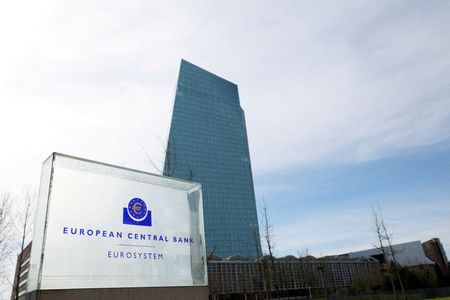By Stefania Spezzati and Elisa Martinuzzi
LONDON (Reuters) – At least two major banks in Europe are examining scenarios of contagion in the region’s banking sector and are looking to the Federal Reserve and the ECB for stronger signals of support, two senior executives close to the discussions told Reuters.
The fallout from the crisis of confidence in Credit Suisse Group AG and the failure of two U.S. banks could ripple through the financial system next week, the two executives separately told Reuters on Sunday.
The two banks have held their own internal deliberations on how soon the European Central Bank should weigh in to highlight banks’ resilience, specifically their capital and liquidity positions, the people said.
A focus of these internal discussions is whether such statements might create even more alarm if they are made too soon, the people said.
The executives said their banks and the sector are well capitalised and their liquidity is strong, but they fear the crisis of confidence will sweep up more lenders.
One of the executives said the Federal Reserve might have to move first as the failures of Silicon Valley Bank and Signature Bank in the United States earlier this month triggered the concerns in Europe.
A third executive at another major European bank separately told Reuters they thought the ECB would be reluctant to make a public statement before markets reopen, questioning whether they would judge it necessary at this time and adding that the main focus was still on talks in Switzerland. The ECB declined to comment. The Fed had no comment.
UBS is close to finalizing a deal to buy its rival Credit Suisse, a source familiar with the matter told Reuters on Sunday. The deal is valued at more than $2 billion after UBS increased its offer, the Financial Times earlier reported, with a news conference expected later on Sunday.
A further selloff in banks could erode confidence depositors have in their lenders. Since the U.S. banks’ collapse, savers have been moving funds to bigger lenders in a flight to safety that undermines the sector’s ability to lend.
Former Goldman Sachs CEO Lloyd Blankfein said on Sunday the banking crisis in the United States was going to expedite overall credit tightening and slow the U.S. economy.
In Europe, companies still rely mostly on bank loans to fund their growth, meaning the real economy is more sensitive to banks.
The ECB on Thursday stuck with plans for a half-point rate rise to contain inflation. But it stressed it was monitoring market tensions and would respond as necessary to preserve price stability and financial stability in the currency bloc.
FINANCIAL SYSTEM
As one of 30 global systemically important banks, Credit Suisse’s problems could affect the entire financial system, industry executives have said.
U.S. and European banking stocks have slid 22% and 17% respectively so far in March, putting them on track for their biggest monthly drops since March 2020 when the COVID-19 crisis rattled markets.
As regulators try to stop the loss of confidence in Credit Suisse before markets reopen on Monday, one source said earlier on Sunday that the talks with UBS were encountering significant obstacles, and 10,000 jobs may have to be cut if the two banks combine, Reuters reported.
The Swiss lender last week became the first global bank to receive an emergency liquidity line since the financial crisis.
In a sign of further strain, a coalition of midsize U.S. banks, Mid-Size Bank Coalition of America (MBCA), has asked regulators to extend FDIC insurance to all deposits for the next two years, Bloomberg News reported on Saturday citing an MBCA letter to regulators.
The letter said that extending insurance will stop the exodus of deposits from smaller banks, in turn helping to stabilise the banking sector, the report said.
The U.S., UK and Swiss central banks all hold scheduled meetings this week.
Despite still-high inflation, the banking turmoil has forced traders to rapidly re-price expectations for further rate hikes as overly high interest rates can cause a fall in demand for new loans, damaging banks’ profits.
Markets price in just a 60% chance of a quarter-point rate hike at the Fed’s meeting this week, a sharp turnaround from expectations for a bigger half-point move earlier this month.
(Additional reporting by Balazs Koranyi, Dan Burns and Iain Withers; Writing by Dhara Ranasinghe; Editing by Paritosh Bansal, Barbara Lewis and David Holmes)





